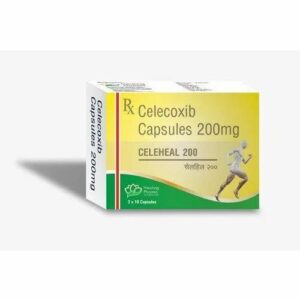CELECOXIB
CELECOXIB: Celecoxib is a nonsteroidal anti-inflammatory drug (NSAID) that belongs to the class of selective cyclooxygenase-2 (COX-2) inhibitors. It is commonly sold under the brand name Celebrex.
Celecoxib is primarily used to relieve pain, reduce inflammation, and treat symptoms associated with various conditions such as osteoarthritis, rheumatoid arthritis, ankylosing spondylitis, and menstrual cramps. It can also be prescribed to reduce the number of colon and rectal polyps in patients with familial adenomatous polyposis.
The drug selectively inhibits the enzyme COX-2, which is responsible for the production of prostaglandins involved in pain and inflammation. By targeting COX-2, which is primarily present at sites of inflammation, celecoxib reduces pain and inflammation without significantly affecting COX-1, an enzyme responsible for gastrointestinal protection.
The recommended dose of celecoxib depends on the underlying condition being treated. For osteoarthritis, the usual dose is 200 mg per day taken as a single dose or divided into twice-daily doses of 100 mg. For rheumatoid arthritis, the recommended dose is 100 to 200 mg twice daily. The dosage may be adjusted based on individual response and tolerability.
Like all medications, celecoxib can cause side effects. Common side effects include headache, dizziness, stomach upset, heartburn, diarrhea, and swelling in the extremities. Some individuals may also experience an increased risk of cardiovascular events such as heart attack or stroke, particularly with long-term use or at higher doses.
Serious allergic reactions to celecoxib are rare but can occur. Seek immediate medical attention if you experience signs of an allergic reaction such as rash, itching, swelling, severe dizziness, or difficulty breathing.
It is important to note that celecoxib may increase the risk of gastrointestinal ulcers, bleeding, and perforation, especially in individuals with a history of stomach ulcers or bleeding disorders. Therefore, it is crucial to discuss your medical history, ongoing medications, and potential risks with your healthcare provider before starting celecoxib.


